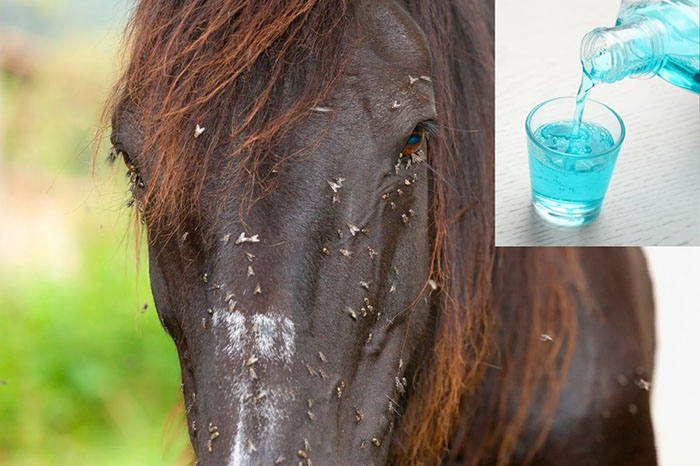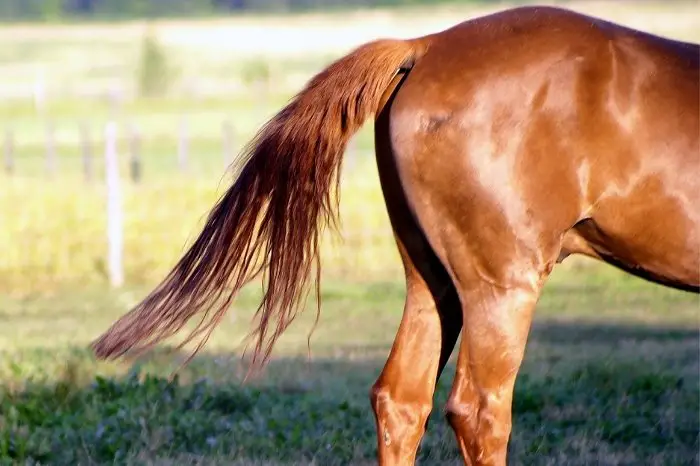Last Updated on January 29, 2023
With the warm weather comes those pesky gnats, flies, and irritating bugs, making it time to find a solution, such as homemade Listerine fly spray for horses. Knowing how to make a homemade fly spray is great for when your bottle runs out, or your want a more natural alternative. Here we will look at a popular option.
Will Homemade Fly Spray For Horses Listerine Actually Work
One of the main reasons people choose to use a homemade fly spray on their horses is to reduce the number of harsh chemicals coming into contact with the skin. This isn’t just for the horse, but the people handling the horse. But do these sprays actually work?
The homemade fly spray does work and can effectively help keep your horses comfortable. However, it is important to understand that they do not provide protection for long periods. Unlike chemical fly spray that can kill the insect, homemade versions work as a repellent.
To work a homemade fly spray will require proper application more than once per day. By proper, we mean that the spray must connect with the coat, and not float off into the air as you apply it. The spray also needs a good base.

Precautions To Take When Making Homemade Horse Fly Spray With Listerine
Always take precautions when mixing a homemade fly repellent for horses. Many recipes call for essential oils. But just because they are natural, it does not mean that they won’t harm your horse.
The oils can cause skin irritations, coat discoloration, burns, and allergic reactions. Always make sure you use them with the correct dilution to avoid this. And always spot test new ingredients to make sure your horse isn’t allergic.
Allergic reactions can appear as hives, itching, a rash, or some kind of general discomfort. Also, use caution using some types of oils. When out in the sun, these oils can lead to burns.
Homemade Listerine Fly Spray For Horses
Listerine is an inexpensive and usually safe product to use as a fly spray. It is often something you have in the house, and if not, a quick run to the store is all it takes to get it. This makes it a good backup option if you can’t easily get to a tack shop.
Listerine Freshburst Antiseptic Mouthwash with Germ-Killing Oral Care Formula
The reason Listerine has a reputation for repelling flies is one of its ingredients: eucalyptus oil. Eucalyptus oil in high enough concentrations is often found an effective bug repellant. However, the concentration in Listerine is too low to achieve good protection.
To create a Listerine fly spray that offers good protection, you will need to combine it with some other ingredients. If you want to try Listerine on your own, keep in mind, it is not very potent, and you will probably have to reapply it often. However, on its own, it is one of the safer options for both humans and horses.
Listerine Fly Spray Recipe For Horses
Here we will share some homemade Listerine fly spray for horses recipes. We have not personally tested these recipes, so advise users to use them at their own risk and do a patch test first.
Baby Oil And Listerine
This is a simple recipe to use on the top of a horse’s tail. Small insects can burrow under the hair, causing irritation. The irritation will lead to itching.

By rubbing the mixture into the tail, you can soothe the itchiness and provide some mild antiseptic effects. To make this repellent, simply dilute the Listerine with equal parts of baby oil. The main precaution to take with this option is the risk of the baby oil causing burns with sun exposure.
Listerine And Vinegar
Another simple homemade fly spray for horses is mixing amber Listerine and apple cider vinegar. This is a super quick and easy remedy. Just mix equal amounts of each ingredient in a spray bottle and apply it to your horse.
3 Ingredient Recipe
The third recipe to share uses Listerine, baby oil, and white vinegar. Add 2 cups of white vinegar, 2 cups of Listerine, and 2 cups of baby oil into a bottle and shake it well. You will probably have to shake this mixture well before each use.
5 Ingredient Recipe
Our final homemade fly spray is the most complicated, but only in that it uses several ingredients. In a large spray bottle, combine 1 cup of Avon Skin So Soft, 1 cup vinegar, 1 cup Listerine, 1 ounce of citronella (make sure you get the safe kind), and 4 ounces Laser Sheen. Use water to fill the remainder of the space left in your bottle and shake well.
Conclusion
Listerine on its own is probably not the most effective equine fly spray option. However, it is handy for some last-minute short protection. When mixed with other insect repelling ingredients, the protection is better.
Finally, it is a safe choice, just don’t forget to patch test all of your ingredients before covering your horse.
What does Listerine do for horses?
Listerine is a well-known brand of mouthwash that is inexpensive and widely available. It can be used for a number of purposes around the horses and the barn. For example, original Listerine (yellow one is believed to work the best) is a popular treatment for mild to moderate cases of rain rot and scratches, itchy tails and manes, and dandruff. It can also be used for cleaning and disinfecting water and feed buckets and for disinfecting bits. One of the most popular uses of Listerine is as a fly repellent – you can spray it directly onto your horse as well as around the barn to keep flies away. It is also effective for eliminating bot fly eggs and lice from horse’s coat.
Can you spray Listerine on horses?
Yes, in most cases Listerine is fine to spray directly on your horse but people usually prefer to mix it with baby oil. Listerine used on it’s own can dry out the skin and hair. But if you mix it with baby oil at a 50:50 ratio, you will prevent this side effect. Some people also prefer to dilute Listerine to make it last longer.
However, no matter what kind of mixture you are using it’s always recommended to test it out first. Only spray it on a small area on your horse’s skin and wait until you are sure your horse doesn’t experience any kind of allergic reaction or discomfort before you use it on their entire body. If the reaction occurs stop using the product immediately, wash it out of the skin and consult your vet if needed.
Does mint mouthwash keep bugs away?
The majority of mouthwashes contain some sort flavoring. Peppermint or spearmint flavors are the ones used very often and they are known for their ability to naturally repel mosquitoes and insects. Insects don’t like the smell of these aromas, so when you use them, you will be less likely to get bitten by a bug.
These mouthwashes contain alcohol as a preservative, which can cause a burning sensation if used on damaged skin. Keep that in mind if using any of these products as a repellent on your skin or on a skin of your horse companion.
How long does Listerine keep mosquitoes away?
The effect of Listerine is supposed to lasts for at least three hours. However, Listerine actually hasn’t been tested as an insect repellent but since it contains eucalyptus and menthol essential oils, it can be used as an insect repellent. Insects such as flies, fleas, mosquitoes, cockroaches, and other bugs don’t like the smell of eucalyptus and menthol so they won’t be that much attracted to you if you apply some Listerine on your skin.
What are ingredients in Listerine?
Listerine contains a variety of ingredients, including alcohol, water, and other chemicals. The product has been marketed as a mouthwash for years, but it is also used as a disinfectant and anti-bacterial cleanser. The active ingredient in Listerine is thymol, an organic compound derived from the essential oil found in thyme. It also contains 3 other essential oils, which may account for its other uses: menthol, eucalyptus, and wintergreen. Other ingredients in Listerine are Sorbitol, Sucralose, Sodium Benozate, Benzoic Acid, Sodium Saccharin, and Poloxamer 407.
Listerine is an American brand of antiseptic mouthwash that has been around since 1879 and is widely used as a means of keeping mouths and throats free from bad bacteria. The name Listerine was derived from its creator, Joseph Lister, who pioneered antiseptic surgery at the Glasgow Royal Infirmary in Scotland.
Michael Dehaan is a passionate horse owner, horse rider, and lover of all things equine. He has been around horses since he was a child, and has grown to become an expert in the field. He has owned and ridden a variety of horses of different breeds, and has trained many to compete in shows and competitions. He is an experienced horseman, having worked with and competed many horses, including his own. He is an active member of the equestrian community, participating in events and teaching riding lessons.

